|
|
|
Sort Order |
|
|
|
Items / Page
|
|
|
|
|
|
|
| Srl | Item |
| 1 |
ID:
192991
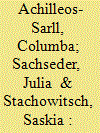

|
|
|
|
|
| Summary/Abstract |
Visuals, including photographs and data visualizations, play a crucial role in the politics of EU border security, both as an internal governance tool (e.g. in surveillance) and as an external means of communication/representation (e.g. in photojournalism). Combining scholarship on photographic representations of migration with literature on surveillance technologies and data visualizations, we argue that these visuals interact to reproduce gendered and racialized meanings of migration and border security. Using a feminist postcolonial lens, we develop an intervisual framework for studying how processes of gendering and racialization render subjects, practices and spaces knowable at the intersection between these visuals. We apply this framework to a case study of Frontex’s Risk Analysis Reports (2010–2021) and demonstrate how it is applicable to other security institutions. The intervisual analysis reveals how the migrant Other and (white) European are visually reproduced through: 1) the (in)visibilization of bodies; 2) the ascription and denial of agency; and 3) the spatialization of borders as ‘frontier imaginings’ that oscillate between fortification and expansionism. The intersectional co-constitution of gender and race, we conclude, is central to the visual politics of Frontex, contributing to problematizing migrants and migration and legitimizing violent border practices.
|
|
|
|
|
|
|
|
|
|
|
|
|
|
|
|
| 2 |
ID:
182546
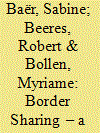

|
|
|
|
|
| Summary/Abstract |
From 2011, due to war, conflict, and ensuing unrest, both in the Middle East and Africa, the European Union’s southern external borders were confronted with an influx of migrants and refugees. At its height, the influx became known as a migration (or refugee) crisis and the European Border and Coast Guard Agency (FRONTEX) was perceived as a pivotal partner in crisis management at the borders. FRONTEX does not avail of its own operators nor materiel, and, consequently, Schengen member states and Schengen Associated Countries were requested to contribute personnel and equipment for operations. From 2012 to 2018, this article analyzes the member states’ burden-sharing behavior regarding their contributions to European Border Guard Teams and Technical Equipment Pool. Our findings include both over- and under-contributors. As the sum total of contributions over all member states is high, it could be concluded, member states derive common benefits from border management. However, results also show that, as compared to others, member states situated at the European Union’s Southern and Eastern borders, on average, are over-contributing. Moreover, contributions from individual member states fluctuate over time. Apparently, the acquired benefits are not always perceived in the same way.
|
|
|
|
|
|
|
|
|
|
|
|
|
|
|
|
| 3 |
ID:
160087
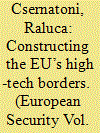

|
|
|
|
|
| Summary/Abstract |
FRONTEX has highlighted Remotely Piloted Aircraft Systems (RPAS) as affordable and efficient capabilities for securing the EU’s vast frontiers in order to further upgrade them into smart technological borders. In this regard, this article examines the EU’s strategy and rationalisations to develop dual-use technologies such as aerial surveillance drones for border management. By drawing on critical security and technology studies and by focusing on their functional technological efficiency, the article argues that drones are being normalised in a technological regime of exclusion at the border-zone. It further contends that high-end technologies such as drones introduce a military bias as security enablers in border surveillance and as a panacea for the consequences of failed policies to manage irregular migration. A closer examination of several EU-endorsed drone projects reveals a pragmatic and industry-driven approach to border security, underlining the evolving homogenisation between internal and external security and the imminent “dronisation” of European borders.
|
|
|
|
|
|
|
|
|
|
|
|
|
|
|
|
| 4 |
ID:
101141
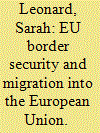

|
|
|
|
|
| Publication |
2010.
|
| Summary/Abstract |
This article examines the contribution of the activities of FRONTEX, the Agency in charge of managing operational cooperation at the external borders of the European Union (EU), to the securitisation of asylum and migration in the EU. It does so by applying a sociological approach to the study of securitisation processes, which, it argues, is particularly well-suited to the study of securitisation processes in the EU. Such an approach privileges the study of securitising practices over securitising 'speech acts' in securitisation processes. After identifying two main types of securitising practices in general, the article systematically examines the activities of FRONTEX and the extent to which they can be seen as securitising practices on the basis of these two (non-mutually exclusive) criteria. The article shows that all the main activities of FRONTEX can be considered to be securitising practices. The article therefore concludes that the activities of FRONTEX contribute to a significant extent to the ongoing securitisation of asylum and migration in the EU. It also highlights that this does not automatically make FRONTEX a significant securitising actor in its own right and that more research is needed on the relations between FRONTEX and the EU institutions, especially in the light of the current negotiations aiming to amend the founding Regulation of FRONTEX.
|
|
|
|
|
|
|
|
|
|
|
|
|
|
|
|
| 5 |
ID:
138872
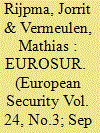

|
|
|
|
|
| Summary/Abstract |
This article analyses the origins and development of the European Border Surveillance System (EUROSUR) in order to better understand its functioning in view of its stated objectives. Particular attention will be devoted to the European Commission’s recurring claim that one of EUROSUR’s main goals is to save lives at sea. This contribution questions that assertion. It rather considers EUROSUR as representative of the steady, technocratic development of a European system for border management. The reliance on the exchange of information, the reinforcement of FRONTEX, the European Union’s agency for the coordination of operational cooperation between national border guards and the emphasis on cooperation with third countries support this claim.
|
|
|
|
|
|
|
|
|
|
|
|
|
|
|
|
| 6 |
ID:
129584
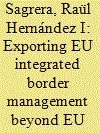

|
|
|
|
|
| Publication |
2014.
|
| Summary/Abstract |
The external dimension of European Union (EU) border management cooperation has recently been developed, in particular through the promotion of integrated border management (IBM). The European Commission has been keen to foster IBM, an attempt to reach EU standards in the absence of an EU common border service. Integrated border management is regulated under the Treaty of Lisbon, and the Stockholm Programme calls for its further development. This article analyses and compares the policy instruments promoting IBM standards beyond EU borders, namely the European Agency for Operational Cooperation at the External Border of the Member States of the EU (FRONTEX) (with the signature of Working Arrangements with the border services of third countries) and the activity of the EU Border Assistance Mission to the Republic of Moldova and to Ukraine (EUBAM) at the Ukrainian-Moldovan border. Moreover, it provides an empirical account of IBM activity carried out in the Eastern Partnership and Russia, and explains the reasons underlying the lack of IBM promotion in the southern Mediterranean countries.
|
|
|
|
|
|
|
|
|
|
|
|
|
|
|
|
| 7 |
ID:
162414
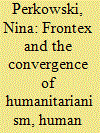

|
|
|
|
|
| Summary/Abstract |
While there has been growing scholarly interest in the convergence of humanitarianism and security in contemporary EUropean border governance, much of the existing literature has neglected the role of human rights in this process. Drawing on in-depth interviews with Frontex officials, this article takes the simultaneous portrayal of the agency as rescuer of migrants at sea, promoter of fundamental rights and defender of EUropean citizens against migrant threats as a starting point to rethink the relationship of humanitarianism, human rights and security in the governing of EUropean borders. Conceptualizing them as discourses of protection that render their subjects vulnerable in various ways, the article contributes to a deeper understanding of the connections and combined effects of humanitarianism, human rights and security in EUropean border governance. Finally, it shows that Frontex’s positioning in humanitarian, human rights and security terms has strengthened the agency in three ways. First, it has allowed Frontex to cooperate with a range of actors in ‘managing’ EUropean borders. Second, it has enabled the agency to become a ‘go-to’ solution to diverse crises in border governance. Third, it has allowed Frontex officials to shift blame for human rights abuses to member-states.
|
|
|
|
|
|
|
|
|
|
|
|
|
|
|
|
| 8 |
ID:
137615
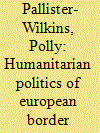

|
|
|
|
|
| Summary/Abstract |
This paper explores humanitarianism in the practice of Frontex-assisted Greek border police in Evros and of Frontex at their headquarters in Warsaw. Building on the increase in humanitarian justifications for border policing practices as well as the charges of a lack of humanity, the paper analyzes the relations between humanitarian responses and border policing where humanitarianism is used for framing and giving meaning to institutional and operational practices. In offering an interpretive view of border policing undertaken by people in their working lives across sites and scales, it builds on the critical literature addressing the multifaceted nature of border control in Europe today. At the same time, it speaks to wider debates about the double-sided nature of humanitarian governance concerned with care and control. It argues that while humanitarian motivations have implications for operations in the field and help to frame “good practice” at the policy level, humanitarianism should not be seen as additional or paradoxical to wider border policing operations within forms of governance developed to address the problems of population. Conflict arises in the paradox of protection between the subject of humanitarianism and policing, the population, and the object of border control, the territorially bounded state or regional unit.
|
|
|
|
|
|
|
|
|
|
|
|
|
|
|
|
| 9 |
ID:
194585


|
|
|
|
|
| Summary/Abstract |
In early 2021, the European Parliament established the Frontex Scrutiny Working Group (FSWG) to monitor all aspects of the functioning of the European Border and Coast Guard Agency (Frontex). The FSWG organized a series of public hearings and carried out a ‘fact-finding’ investigation to gather information and evidence about pushbacks of refugees in the Aegean Sea. By unpacking some of the controversies that emerged during the hearings of the FSWG, I explore how secrecy was practised and strategically employed to obscure the responsibility of Frontex for the reported pushbacks, and how it was contested through the presentation of related evidence. I explain how secrecy and related controversies and struggles over making pushbacks public involve a variety of actors that enrol and interact with a heterogeneous set of objects, including digital, visual and archival traces of violence at sea, as well as databases used to record information about maritime incidents. I argue that secrecy regarding pushbacks is not just about keeping information about people and objects involved in security operations hidden. Secrecy is also produced through the selective recording, (mis)categorization and circulation of information in the name of transparency.
|
|
|
|
|
|
|
|
|
|
|
|
|
|
|
|
| 10 |
ID:
163494
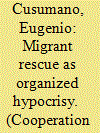

|
|
|
|
|
| Summary/Abstract |
In November 2014, Frontex started its Southern Mediterranean border monitoring operation Triton, followed in June 2015 by the Common Security and Defence Policy anti-smuggling mission EU Naval Force Mediterranean (EUNAVFOR Med) ‘Sophia’. Both operations’ outward communication has placed considerable emphasis on the conduct of maritime search and rescue. Still, this commitment was not matched by consistent action. Triton and EUNAVFOR Med have conducted a relatively limited number of search and rescue operations, prioritizing border control and anti-smuggling tasks. This article explains the gap between the European Union missions’ humanitarian rhetoric and an operational conduct primarily focusing on curbing irregular migration as a form of organized hypocrisy. Decoupling talk and action allowed Triton and EUNAVFOR Med to reconcile the conflicting expectations arising from European governments’ willingness to reduce migrant arrivals and the normative imperative to act against the loss of life at sea. However, the European Union missions’ organized hypocrisy had several negative externalities, hindering effective management of the humanitarian crisis offshore Libya.
|
|
|
|
|
|
|
|
|
|
|
|
|
|
|
|
|
|
|
|
|